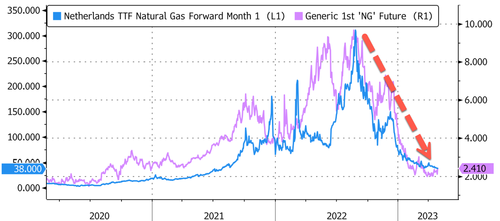The Northern Hemisphere experienced warmer-than-average temperatures last winter, which helped ease energy crises and caused liquefied natural gas prices to fall from record levels. Now the world’s biggest gas buyer expects another price hike this year.
In an interview with Bloomberg, Yukio Kani, president and CEO of Jera Co., expressed concern about another potential increase in LNG prices, attributing it to increased import capacity in Europe and the China, along with possible severe weather risks.
Here is part of the interview:
This winter, with increased import capacity in Europe and a potential increase in demand from China after the end of pandemic restrictions, prices could rise again if there is severe weather, he said . There is no opportunity for buyers to “let their guard down,” Kani said.
Jera, a company between Tokyo Electric Power Co. Holdings Inc. and Chubu Electric Power Co., announced Friday that it agreed to a 20-year deal to buy LNG from Venture Global LNG Inc.’s proposed terminal. in Louisiana. While the company expects Japanese LNG demand to decline over the next decade, it could be surprisingly flat as more data centers and semiconductor factories are built, Kani said.
“Both of these facilities consume electricity, which makes it difficult to read the demand outlook,” he said.
Jera is also working to support Japan’s plans to use ammonia and hydrogen to decarbonize existing thermal power plants. The strategy has received pushback from other countries, most recently at the Group of Seven meeting of energy and environment ministers. -Bloomberg
Kani’s comments come as Asian spot LNG futures are down 83.5% from a peak last September, hitting lows not seen in the summer of 2021.
On the other side of the world, US NatGas and European NatGas futures are at multi-year lows.

Kani’s prediction of severe weather could be related to the likely return of the El Nino climate phenomenon this year, which may contribute to higher global temperatures and a subsequent increase in demand for cooling, leading to a greater need for gas. Also, as Europe restructures its energy supply chain away from Russia and becomes more dependent on US LNG shipments, supplies may face further tightening. In addition, an increase in China’s economic recovery could also boost LNG demand.
